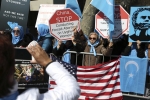Today, Stand With Victims of Blasphemy Laws
Last Wednesday, a mob of roughly 5,000 Muslims in Pakistan descended upon a small town called Jaranwala, outside Faisalabad. Their target was a largely Christian neighborhood. They began to riot, torching at least five churches – some reports put the number at 21 – and destroying many homes. The purpose of the mob? Retaliation for alleged blasphemy by two Christian brothers accused of having ripped pages out of a Quran and written insults on them.
The videos of the attack garnered widespread condemnation on social media. But mob attacks are common occurrences in Pakistan and many other parts of the world. Today, August 22, is the UN International Day Commemorating the Victims of Acts of Violence Based on Religion or Belief. Remember in your prayers the many victims of blasphemy accusations.
Just this year in Pakistan, there have been more than 60 reported cases of blasphemy, and many people have lost their lives from mob violence and extremists after facing such accusations. A Christian man in Pakistan was recently charged with blasphemy merely because he posted a Bible verse on Facebook. Blasphemy accusations are often used as a cudgel and pretext to abuse religious minorities, such as in the cases of Asia Bibi and Shagufta Kausar and Shafqat Emmanuel.
The pretextual nature of these accusations and the weaponization of mobs certainly looks to explain last week’s brutal attack in Jaranwala. Outspoken Bishop of the Church of Pakistan Azad Marshall wrote, “A church building is being burnt as I type this message. Bibles have been desecrated and Christians have been tortured and harassed having been falsely accused of violating the Holy Quran.” He continued, “We cry out for justice and action from law enforcement and those who dispense justice and the safety of all citizens to intervene immediately and assure us that our lives are valuable in our own homeland.” For its part, local police have claimed to have arrested more than 100 rioters. Whether those rioters will be prosecuted is another matter.
Pakistan is one of at least seven countries in the world with a possible death sentence for blasphemy. Over the summer, Pakistan has moved to make their laws somehow even harsher by extending the blasphemy laws to cover insults against Muhammad’s family and close associates, with a potential life sentence.
Those charged with blasphemy in Nigeria can also face a death sentence. Last year, Christian student Deborah Emmanuel Yakubu was brutally stoned to death by her classmates in Sokoto, Nigeria, after they claimed she had made blasphemous remarks against Muhammad on a WhatsApp channel, although one of her “offenses” may have just been thanking Jesus for helping her pass an exam.
Rhoda Jatau, a Christian, condemned Deborah’s lynching by sharing a video with her work colleagues, and for that has been charged with religious insult and detained incommunicado for well over a year. Her neighborhood also was attacked by a mob at the time. Two of Deborah’s attackers had their criminal cases dismissed earlier this year for failure to prosecute in a timely manner.
Additionally, Usman Buda, a Muslim butcher, was stoned to death just last month in Sokoto. All of these incidents quickly gained attention on social media.
One victim of mob violence in Nigeria, Yahaya Sharif-Aminu, is currently challenging the death penalty blasphemy laws of Northern Nigeria at the Supreme Court. Yahaya, a Sufi Muslim, has been held in prison since March 2020. His home was burned down by a mob after he posted lyrics he had written on social media that others deemed blasphemous. He was not afforded a lawyer at his trial, and the judge sentenced him to death by hanging. His conviction was overturned, but he was ordered to a retrial, where he would face the same potential death penalty. Last May, the European Parliament called on Nigeria to release him immediately. Yahaya is still in prison, awaiting his Supreme Court hearing date.
I ask you to remember these individuals, persecuted based on allegations of blasphemy. Pray for them, because they are far too often forgotten or ignored. And unfortunately, it is not clear that the free world is standing up effectively against those who are persecuting the defenseless.
In fact, many of the countries that traditionally stand for freedom are caving to the demands of countries like Pakistan, which has been pushing successfully for greater censorship and criminalization of blasphemy at the UN Human Rights Council this year. Last month, a UN General Assembly resolution was unanimously adopted that implicitly promotes greater censorship of religious speech that others find offensive. Many Western countries had reservations about these moves, but their inability to reverse this trend is deeply worrying. When supposedly free countries wield “hate speech” laws to criminalize Christians’ religious speech, as with Finland’s continuing prosecution of MP Päivi Räsänen, they undermine the ability to advocate for freedom of expression and religious freedom elsewhere.
A failure to speak up forcefully and defend these most fundamental freedoms can have deadly results, as in Pakistan and Nigeria. So please, on this day when we remember the victims of violence based on religion or belief, the many Christians and other religious minorities who suffer daily for their faith, say a prayer for all of them. God hears.









